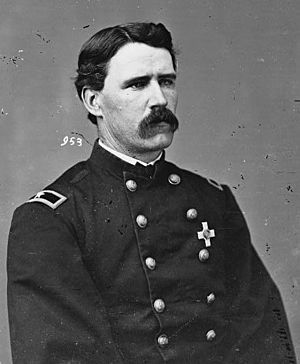Martin T. McMahon facts for kids
Quick facts for kids
Martin Thomas McMahon
|
|
|---|---|

Martin Thomas McMahon
|
|
| Born | March 21, 1838 La Prairie, Quebec, Canada |
| Died | April 21, 1906 (aged 68) New York City, New York |
| Place of burial | |
| Allegiance | United States of America Union |
| Service/ |
United States Army Union Army |
| Years of service | 1861–1866 |
| Rank | |
| Unit | |
| Battles/wars | American Civil War |
| Awards | |
Martin Thomas McMahon (born March 21, 1838 – died April 21, 1906) was an American lawyer and a brave officer in the Union Army during the American Civil War. He earned the highest military award in the United States, the Medal of Honor, for his actions during the Battle of White Oak Swamp. After the war, he worked in many important legal jobs in New York State. He also served as the United States Ambassador to Paraguay for a short time and was a New York State Senator for four years.
Early Life and Education
Martin McMahon was born in La Prairie, Quebec, Canada. His family had recently moved there from Waterford, Ireland. When he was a baby, his family moved to the United States and settled in New York.
He went to St. John's College, Fordham, and graduated in 1855. After that, he studied law in Buffalo and earned his master's degree in 1857. He then traveled west and worked for the post office on the Pacific coast. In 1861, he became a lawyer in Sacramento, California.
Civil War Hero
When the Civil War began, Martin McMahon quickly formed a group of cavalry soldiers. He was made a captain and led this unit. However, when he found out his company wouldn't be sent to the main battlefields, he left his command. He then went back east and became a special assistant, called an aide-de-camp, to General George B. McClellan.
McMahon stayed with the Army of the Potomac throughout the entire war. He eventually rose to the rank of lieutenant colonel. He served as an aide to General William B. Franklin and later became the Chief of Staff for the 6th Corps. He was with the 6th Corps commander, John Sedgwick, when Sedgwick was killed in battle. McMahon later wrote a book about General Sedgwick.
Many years after the war, on March 10, 1891, Martin McMahon was given the Medal of Honor. This award was for his brave actions at the Battle of White Oak Swamp on June 30, 1862. His award citation said he "Under fire of the enemy, successfully destroyed a valuable train that had been abandoned and prevented it from falling into the hands of the enemy." This meant he bravely made sure important supplies didn't fall into enemy hands.
Martin McMahon had two older brothers who also served as officers in the war. John Eugene McMahon was injured and later died from his wounds. His middle brother, James Power McMahon, took over the regiment but was killed in battle at the Battle of Cold Harbor.
McMahon left the volunteer army on February 21, 1866. President Andrew Johnson later nominated him to be a brevet brigadier general and then a major general. These special ranks were confirmed by the United States Senate.
Life After the War
After the war, Martin McMahon received another special degree, a Doctor of Laws, from St. John's College, Fordham. He worked as a lawyer for New York City for two years.
From 1868 to 1869, he served as the United States Ambassador to Paraguay. While there, he saw the start of the Paraguayan War, also known as the War of the Triple Alliance. He strongly supported Francisco Solano López, the leader of Paraguay, and wrote many articles that spoke highly of the Paraguayans.
After returning to the U.S., he held several important jobs in New York. He was the Receiver of Taxes from 1873 to 1885. Then, he worked as a U.S. Marshal for four years. During this time, he also became involved with the National Soldiers' Home, an organization that helped soldiers, and served as its president for several years.
Political Career and Death
Martin McMahon was also active in politics. He was a member of the New York State Assembly in 1891. Then, he served as a New York State Senator from 1892 to 1895.
In 1896, he was elected as a judge for the Court of General Sessions. He held this important position until he passed away. Martin McMahon died suddenly in 1906 at his home in Manhattan. He had fallen ill with pneumonia just one day before.
 | Janet Taylor Pickett |
 | Synthia Saint James |
 | Howardena Pindell |
 | Faith Ringgold |

